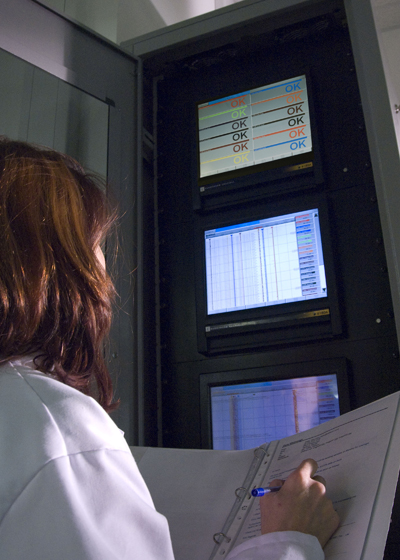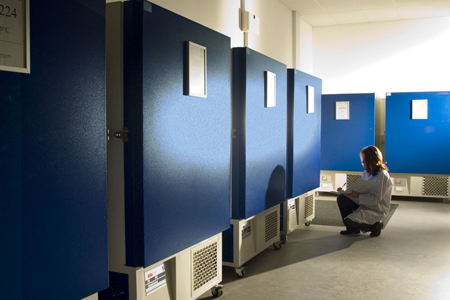Ultra-low temperature storage is a vital but expensive aspect of vaccine distribution. Vindon Scientific considers the pros and cons of outsourcing storage
Anyone in business in the current economic climate knows that it can be an ongoing battle: financial constraints; limitations on capital budget spend; the ever-increasing need to reduce costs. This means that we all share some common challenges. One of these is to discover the right resources and, having found them, to use them to their full potential. In this respect, outsourcing can play a valuable part in a company’s biotech storage regime.
When it comes to ultra-low temperature storage, there are certain feelings within the industry that the use of third parties can be better than a conventional in-house solution. Depending on the company strategy – some organisations prefer 100% control of their own storage – it can make sense to outsource ultra-low temperature storage to an experienced entity based elsewhere.
Quite clearly, this kind of move needs careful thought in terms of price, quality of service and flexibility of approach. In essence, storage would take place elsewhere but the actual testing would continue to be handled in-house.
Many pharmaceutical and biological companies have discovered the benefits of calling on the expertise of a contract biotech storage organisation. They know that they will profit from outsourced storage of their products in several ways: outsourcing eliminates the need for large capital expenditure on freezers; and off-site storage enables companies to make more productive use of their own facilities.
They can also focus their internal resources on core competencies, enabling their workforce to concentrate on new drug development. Outsourcing can also reduce the requirement for extra valuable laboratory space, as well as removing the need to service and calibrate their own equipment regularly.
One of the factors, often overlooked when considering outsourcing, is engineering cover. This is crucial throughout every single day across the year. Equally important is the need for a disaster recovery plan. How else could you rectify a freezer breakdown within your specified timeframes?
The GMP service provided by the outsourcing partner should always meet legislative obligations. These regulations should always be an adjunct to storage in validated freezers, including back-up freezer capacity. It is very important that samples, when requested, are returned in the correct packaging, following the mandatory protocols set out at the start of the contract.
Your outsourcing partner should be an expert, or utilise a third party supplier with the relevant competencies in cold chain delivery. The storage and distribution service should provide their clients with greater flexibility and, when undertaken correctly, should result in greater efficiencies within the company. Buyers of the outsourcing service can then relax in the knowledge that storage and cold chain experts are handling their drugs.
The increasing demand for long-term storage of biopharmaceuticals has led outsourcing companies to increase the scope of their premises. Vindon Scientific, a UK-based pharmaceutical stability storage and biotech services company, has recently improved its ultra-low temperature storage capability to reflect this need. More space means that clients can store large volumes of material for long periods in GMP-compliant conditions. This now meets the growing demands of manufacturers and, importantly, is encouraging worldwide uptake.
Reliable software can also make a significant difference when tracking sample locations and quantities. It is important to comply with regulations for audit trails and security compliance in order to meet inspection regulations.

The cabinets are continually monitored by the CFR 21 Part 11 compliant data acquisition system
Vindon, for example, has it own inventory management software (VIMS), which provides a comprehensive management tool for sample storage in ultra-low freezers. The VIMS system stores the precise location of each sample. It identifies the freezer reference, shelf reference and unique box or sample. All activities such as residency, removals, moves, relocations and returns, are recorded with the individual's identification, together with the precise time and date of the action.
A variety of circumstances may compromise vaccine storage conditions. Equipment failures, power outages and improper storage temperatures can all lead to studies becoming invalid. It is important that companies have an emergency vaccine retrieval storage plan in place. Protection and retrieval of vaccines as quickly as possible is crucial when a potentially compromising situation is looming.
The probability of any company experiencing fire, power cuts, floods, storms or any other potential disaster is unlikely, but any one of these events could prove to be disastrous for its stability storage and testing operations. That is why a failsafe disaster recovery plan is needed.
Commercial organisations are increasingly reviewing their outlook on disaster recovery. The objectives of any disaster recovery plan can really be defined as:
- Minimising potential economic loss
- Insuring against the loss of products in storage
- Counteracting the disruption to stability storage activities
- Reducing the critical loss to a company
- Providing an orderly recovery of product
One potential way forward could be to continue to maintain an in-house stability storage suite but, in parallel to this, a duplicate set of samples could be retained by a third party in a different but secure second geographical location. This approach is well worth considering on the basis that it virtually eliminates the risk of a disaster scenario destroying valuable vaccine storage samples and causing commercial damage to the company concerned.
minimum criteria
So, what criteria should be considered when choosing an outsourcing partner? The right storage partner should allow a company to feel confident in the efficiency and quality of service being offered. State-of-the-art ultra-low freezer storage facilities should have:
- A high-security environment, including access control systems, motion detectors, smoke detectors and continual CCTV surveillance
- Computer-controlled guarantees of temperature integrity, with constant monitoring
- Full emergency back-up, including spare freezers
- Dedicated service teams on call 24/7 to ensure immediate response and remediation in the event of emergency breakdowns
- Proactive technicians to monitor equipment and provide preventive maintenance and repairs.
A comprehensive biobank should be capable of providing a centre for the preservation of biological samples, vaccines, bone marrow, culture collections, DNA, and microbial and viral seed stocks. All safety issues must be in strict accordance with the latest regulations, with staff and systems in place to offer first-class biological storage conditions.

All -80ºC cabinets are physically checked on a daily basis
Ideally, the facility will provide a storage solution for short, medium and long-term temperature-controlled management, and will incorporate secure storage and real-time tracking of the stored samples.
In summary, some companies still favour total control of their own storage but an experienced contract organisation can provide significant product security, as well as bring vital cost benefits to beleaguered bottom lines. Companies should not, however, be paying charges for set up, transactions or removing samples: instead, expect a standard monthly or annual fee.
Most companies find that outsourcing storage is a simple, cost-effective arrangement. It offers a very precise and intricately managed service – giving company owners much needed peace of mind in these troubled times.
